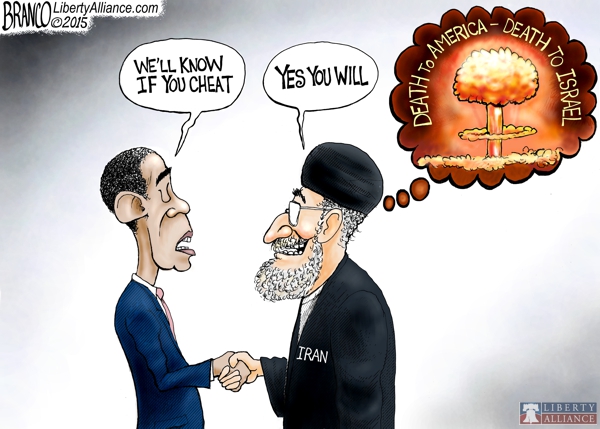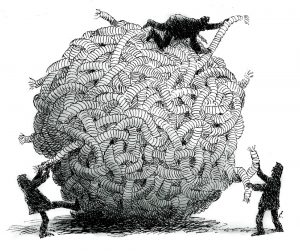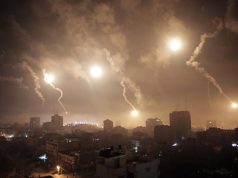.
 SaveTheWest.com contributor writer Erez Winner spent 25 years in the Israel Defense Forces, and retired as a colonel.
SaveTheWest.com contributor writer Erez Winner spent 25 years in the Israel Defense Forces, and retired as a colonel.
To the observer, the Middle East seems tied up in complete chaos, and this understanding is not far from reality. Since March 2013, the outbreak of the “Arab Spring,” which has long since become the “Arab Winter,” took place in the Middle East and created significant processes that changed the face of the region. More than two years later, these processes are very far from stable.
Into the internal processes fits hostility old and deep within the Muslim world between Sunnis and Shi’ites, in addition to the involvement of major outside powers, led by the return of the power block competition between President Putin’s Russia and the United States under the leadership of President Obama. Both should be noted at this stage, because their significant role in the development of these chaotic processes in the Middle East.
 The Shi’ite camp is led by Iran, the same extreme theocracy with which President Obama struggled to sign an agreement (though Iran has not officially signed it). The JCPOA Agreement will allow Iran to become a nuclear threshold state and produce a nuclear bomb within 10-15 years, or as soon as they wish, if they choose to cheat.
The Shi’ite camp is led by Iran, the same extreme theocracy with which President Obama struggled to sign an agreement (though Iran has not officially signed it). The JCPOA Agreement will allow Iran to become a nuclear threshold state and produce a nuclear bomb within 10-15 years, or as soon as they wish, if they choose to cheat.
Iran is already the world’s number one terrorist supporter, and is leading the struggle for Shi’ite hegemony over the Sunnis. Iran is involved in the fighting in Iraq, alongside Shi’ite militias against Sunni ISIS. At the same time, they are involved in supporting, arming and training the Shi’ite Houthi in Yemen. Needless to mention, Iran is deeply involved in fighting in Syria, to support Alawi (a sect originated from Shi’a) Assad regime with the assistance Hezbollah, against the Sunni opposition forces including ISIS.
On the other hand, the Sunni camp is led by Saudi Arabia and other Gulf States, who fear a strengthening Iran. This concern stems from a purely economic aspects, such as controlling the Persian Gulf and the its effect on oil prices, alongside with a 1,400 year Sunni-Shi’ite religious struggle. Saudi Arabia has expanded its role during this period, from supporting statements and funding Sunni forces fighting in Syria, and from involving itself in limited military involvement during the coup attempt in Bahrain Shi’ite neighbor, to now becoming actively involved in combat as seen recently in Yemen.
On the “moderate” Sunni side stands Egypt, led by President al-Sisi, who is struggling to improve the difficult economic situation of the country, but enjoys significant financial support from Saudi Arabia and the UAE. At the same time, al-Sisi is fighting Sunni Islamic extremists from the school of ISIS, in Sinai and neighboring Libya. Recently, with the worsening situation in Yemen and the threat of a Shi’ite takeover of the country, Egypt began to take an active part in the fighting in Yemen. Egypt wisely blockaded the transfer of weapons from Iran to the Houthi forces and sought to maintain the freedom of naval transportation for the vital oil trade through the Bab el Mandeb Strait. In addition to the fight described above between Sunnis and Shi’ites, Egypt is fighting for power and influence.
Further destabilizing Egypt, President Obama refused to support President Mubarak and contributed to his downfall and the subsequent rise of Egypt’s Muslim Brotherhood regime. After the army, led by eal-Sisi, embarked on a coup and seized power, President Obama was quick to respond and stopped military aid to Egypt, thereby damaging their ability to fight radical terror elements, especially in the Sinai Peninsula against Al Enzer beit al-Maqdis, which later became an extension of ISIS.
President Obama also refrained from bloody fighting in Syria and refused to respond, thereby strengthening the murderous ISIS organization in Syria and Iraq. One can recall his unfortunate three separate admissions (1, 2, 3) in the span of 18 months that he has no strategy for fighting ISIS. President Obama is working energetically to implement the Iran agreement that will allow it to become a nuclear threshold state (as long as it does not produce an atomic bomb during his term), thereby strengthening Iran’s regional position and its ability to continue to support terrorism and radical organizations.
As part of the agreement, President Obama is hoping to get assistance from Iran fighting ISIS in Iraq. This reproachment comes, at the expense of its traditional allies in the Middle East – Israel, Saudi Arabia, Jordan and Egypt. While Obama’s representatives sit and discuss with Iran the implementation of the nuclear agreement, U.S. aircraft are attacking in Iraq in support of Iranian fighters fighting ISIS. The same Iranian forces are helping the Houthis in Yemen to fight against the Arab coalition led by Saudi Arabia and Egypt.
The involvement of Russia adds untold new complications to the region. Russian interest in the regional context is twofold. First, to pay back President Obama for his involvement in the Ukraine, which caused the imposition of sanctions against Russia for its support of Ukraine’s separatists. Second is economic interest. When the U.S. refused to supply arms to certain countries, this opened the door for the Russians to supply them instead. So it was with Egypt after the American embargo on al-Sisi government. At the same time, Russia supplies weapons to Iran, Syria and, more recently, to the Houthis in Yemen.
As mentioned in the beginning, even Machiavelli couldn’t have devised such a chaotic set of processes. To unleash the “Gordian Knot” described above, it required primarily the withdrawal of the U.S. and its lack of support its natural allies in the region. Unfortunately, the Obama administration doesn’t appear to be ready or willing to change its policies, or adapt to new realities.
 The alternative to this chaos would be the establishment of regional alliances based on common interests. Such an alliance is being built among the Sunni states, led by Saudi Arabia and Egypt. Other Gulf States, including Jordan, Algeria and Morocco may join this alliance as well, stemming from their fear of the strengthening of Muslim extremists and maybe even Turkey, on the basis of Sunni identity. In a certain way, Israel can take part in such an alliance (not as a full member and undeclared, but by fostering cooperation and operational intelligence and perhaps even economic aid). Such an alliance can bring about positive change in the face of the Middle East, in the hope that in less than 15 months, there will be a change in the U.S. approach.
The alternative to this chaos would be the establishment of regional alliances based on common interests. Such an alliance is being built among the Sunni states, led by Saudi Arabia and Egypt. Other Gulf States, including Jordan, Algeria and Morocco may join this alliance as well, stemming from their fear of the strengthening of Muslim extremists and maybe even Turkey, on the basis of Sunni identity. In a certain way, Israel can take part in such an alliance (not as a full member and undeclared, but by fostering cooperation and operational intelligence and perhaps even economic aid). Such an alliance can bring about positive change in the face of the Middle East, in the hope that in less than 15 months, there will be a change in the U.S. approach.
Until then, everyone in the Middle East must hold on tight for multiple battles on all fronts, between those countries who want to live, each according to its ability, against the outside threats lying menacingly ahead.
.
.
.




